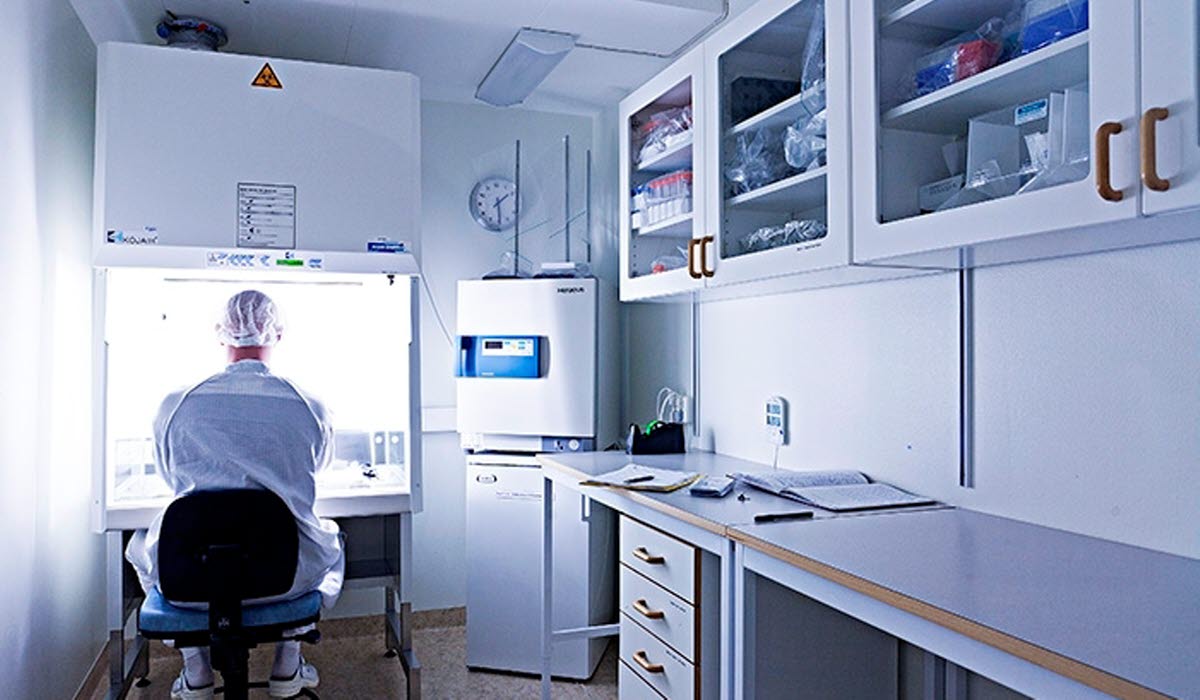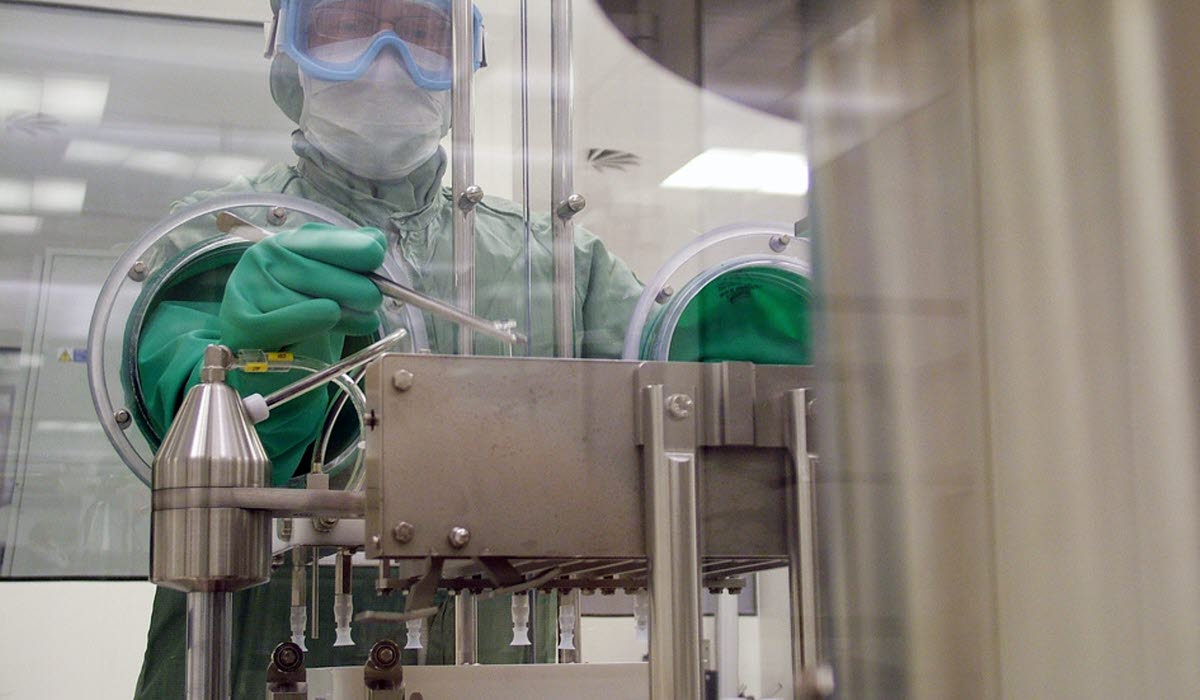- Premium supplier of ultrapure synthetic oligonucleotides used in molecular diagnostics triples production capacity in Sweden
- Expansion into new 2,800 sqm biotech facility in Västerås helps meet increased demand in Europe, USA, South America, Middle East and China
- Cutting-edge cleanroom concept and new machinery pave the way for 24-hour automation and lean manufacturing
Basing diagnosis and treatment on the individual biology of patients (as opposed to the one-size-fits-all approach) is the new frontier of healthcare. And the race is prompting lab researchers to move faster to uncover the secrets of DNA.
When it comes to analysing blood and tissue samples to address chronic diseases such as cancer or HIV with better accuracy, so-called “oligonucleotides” have become gold dust. Demand for this synthesised raw material in the molecular diagnostics industry is soaring worldwide.
In Sweden, Uwe Dehnert, Site Manager at the Dutch-owned oligonucleotide supplier SGS DNA, is hard at work behind the scenes – wasting no time to put an ambitious expansion plan into action.
“We are relocating in Sweden in order to grow the company. We have chosen the city of Västerås due to its strategic location close to Stockholm and its ability to attract skilled professionals. I can safely say that we will never stop recruiting new people,” he enthuses.
Boom time for gene synthesis
Uwe Dehnert’s positive outlook on the market dovetails with recent life science forecasts. According to a report released by Markets and Markets, demand for oligonucleotide synthesis is expected to see an annual growth rate of 13.7% (CAGR) until 2024.
By moving operations from the town of Köping to Västerås – Sweden’s fifth largest city – SGS DNA will approximately triple its production capacity and safeguard its ability to replenish the research labs and diagnostic kits of customers in the years ahead.
The investment of more than €6 million involves a new 2,800 sqm plant equipped with modern machinery and a groundbreaking cleanroom concept.
“Oligonucleotides are a key ingredient for DNA synthesis and sequencing for diagnostic purposes. Our product is unique for its high purity. Around 60 per cent of output goes to our mother company QIAGEN and the rest to customers in clinical research and diagnostics in Europe, South America and USA,” Dehnert explains.
A key driver for the company’s expansion plan is strong growth in a new technology called Next Generation Sequencing (NGS) which has revolutionised throughput and speed in diagnostics. Here, too, oligonucleotides play a critical role. So called UMIs (unique molecular indexes) are a great help in the development of cancer therapy using immunotherapy.
The future is lean
Avoiding cross-contamination between products is perhaps the greatest concern of all at any biotech plant today. At the same time, operations need to be as efficient as possible.
At SGS DNA’s new facility in Västerås, there will be no compromise between the two thanks to a novel approach for lean manufacturing.
“We are implementing an open-plan concept that is tried and tested within QIAGEN. There will be fewer cleanrooms despite our increased production. By using laminar flow units and making smart organisational changes we will create a smoother work flow.”
“We are also striving for automation in our purification process,” Dehnert adds. “I feel complete trust in the Swedish suppliers we rely on, not least in software which will definitely not be a bottleneck.”
Good neighbours
When construction is completed around mid-2020 and SGS DNA moves into its new home, there will be no shortage of high-profile neighbours in the area.
The Finnslätten industrial estate in Västerås has attracted global brand names in recent years including Amazon Web Services, Northvolt and Bombardier. And Dehnert sees great value in being situated just one hour away from Uppsala’s leading life science community.
“Sweden’s life science clusters are very important and we hope to engage in more research collaborations with Uppsala. The location is also good from a logistics perspective. Our products are transported on dry ice, so I think we’ll find better local options for this too.”
Without having moved a single piece of equipment yet, choosing Västerås has already paid off.
“The number of job applications we have received has escalated since we announced our plan for Västerås,” Dehnert concludes. “This is promising and we are now hiring at least ten more people. We look forward to this next step in what seems to be a well-integrated region.”
Finding the right talent
Torbjörn Bengtsson, Director for Investment Promotion at Invest Västerås, points out that SGS DNA’s commitment follows in the footsteps of recent talent-driven establishments in Västerås by Northvolt, AWS, Bombardier and ABB.
Västerås’ long-standing strengths in automation and robotics come into play in several of these projects.
“SGS DNA’s decision to invest is further confirmation of Västerås as a leading European destination for high-tech manufacturing and R&D,” he says.
Bengtsson welcomes the arrival of SGS DNA and points to a key success factor in the relocation process.
“The issue of future recruitment was a top priority. We are working with the company to find a long-term solution for securing a flow of skilled staff. This is partly based on strong links with Mälardalen University and other actors in higher vocational education.”
About SGS DNA
SGS DNA is a wholly-owned subsidiary of the life science company QIAGEN, headquartered in Venlo, The Netherlands, serving more than 500,000 customers in the In Vitro diagnostics industry. SGS DNA was founded in 1990 and is a leading provider of high-quality oligonucleotides. The company currently has more than 70 employees at its facility in Swede





